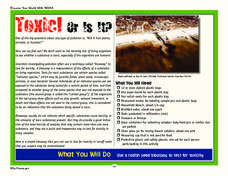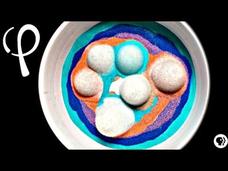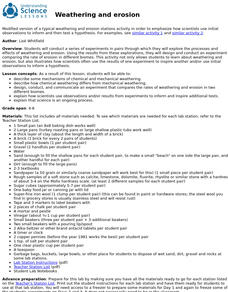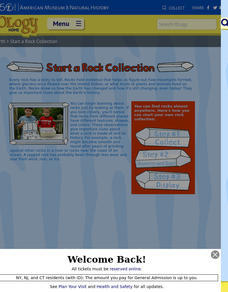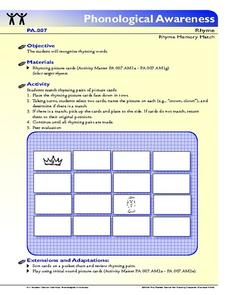Beach Teacher Resources
Find Beach lesson plans and worksheets
Showing 2,097 resources
Balanced Assessment
Vacation in Bramilia
This performance task gives the population model of different types of flies and asks scholars to analyze the two populations. After interpreting the functions individually, participants compare the two populations and find the time...
Elizabeth Murray Project
The Education of Women in Colonial America
What educational opportunities were available to women during the colonial era in American history? How did the opportunities available to women differ from those for men? To answer this question, class members examine a series of...
Chicago Botanic Garden
Weather or Not
What is the difference between weather and climate? This is the focus question of a activity that takes a deeper look at how weather data helps determine climate in a region. Using weather and climate cards, students decide...
ABCmouse
The Four Seasons
Captivating graphics and an upbeat tempo make up a music video detailing the four seasons—spring, summer, fall, and winter. A catchy chorus separates four verses, each singing details about a season as cartoon children and adults...
K5 Learning
Why Does the Ocean have Waves?
Six short answer questions challenge scholars to show what they know after reading an informational text that examines waves—what they are, what causes them, and how different Earth factors affect their size and strength.
NOAA
Toxic! Or Is It?
Super scientists tests the toxicity of water using radish seed bioassays. Over the course of five days, scholars observe the germination process of several radish seeds, looking closely at their roots to determine the level of toxins...
University of Southern California
What Is The Ocean?
Go on a tour of the ocean through the lens of a scientist. Learners read maps of the ocean floor, study tide behavior, examine wave motion, and analyze components of soil. Each lesson incorporates a hands-on component.
Veritasium
How Long Does It Take for the Earth to Go around the Sun?
It's one of those questions that seems simple, but is it? Watch as an interviewer asks people how long it takes for the Earth to go around the sun — and their surprising responses. The video provides a humorous look at a basic earth...
MinuteEarth
The Hottest Place on Earth
Where is the hottest place on Earth, and how can scientists prove it? The video discusses multiple methods for measuring the temperatures across the planet. Then it discusses the hottest places measured by each method and their accuracy....
MinuteEarth
What Happened To This Car?
On June 7, 1692, at 11:43 am, the Jamaican city of Port Royal sank into the harbor, killing more than 2,000 people. The video explains this disaster and others that were caused by liquefaction, describes the conditions required, and...
Prestwick House
A Separate Peace
John Knowles' A Separate Peace is the subject of a literary crossword puzzle that asks readers to identify key events and characters in this coming-of-age story.
Physics Girl
Strange Sand Acts Like Liquid
Can you use a solid to study fluid dynamics? You bet! Science scholars examine the process of fluidization with a video from an extensive physics playlist. The narrator demonstrates and explains how the uniform movement of air causes...
Storynory
Jason and Medea Part Two: The Voyage to Colchis
The second part of Jason and the Argonauts’ journey to Colchis features a boxing match with King Amycus and the defeat of Amycus's army. But what happens when the Argonauts encounter Phineas the seer? Listen to an audio retelling of the...
Birmingham City Schools
Stick to the Point: Getting It Right with Constructed Responses
Practice writing constructed responses with a 26-slide presentation. Developed to guide scholars through the appropriate steps, the resource assists them in providing a well-considered answer.
British Council
Unit 1: Email addresses
E-mail is a communication sensation! Young job seekers discover the essential knowledge required to thrive in an online world in the first of a nine-part series of career education and skills lessons. The resource covers e-mail address...
Meadows Center for Preventing Educational Risk, University of Texas at Austin
Lesson 10 - Compound Words
Individually, words have power, but when added together, they can take on a whole other level of meaning. Readers learn about compound words in the 10th of 17 lessons of the Word Recognition and Fluency series. A script provides guidance...
ProCon
School Uniforms
Americans spend around one billion dollars each year on school uniforms, but are they necessary? As pupils research the debate topic, they form their own opinions. They review the history of school uniforms and discover the top pro and...
University of California
Weathering and Erosion
Just how powerful is erosion? Interested scientists learn how to identify the results of erosion with a series of lab activities. They move through stations to experiment with different types of erosion and then design and complete their...
American Museum of Natural History
Grow Rock Candy
The best way to study crystals is to make your own! A hands-on lesson shows learners how to make their own rock candy from household materials. While they watch the crystals grow, they discover their structure and can even eat their...
American Museum of Natural History
Start a Rock Collection
Rocks hold evidence of Earth's past. A three-step guide describes the process of creating a rock collection. It provides a data collection sheet to make notes about each sample.
NASA
Write the Book on Weather Metrics
It's not easy to measure the weather. Pupils learn about what all weather has in common—the atmosphere. Scholars discover how a meteorologists must be able to measure aspects of the atmosphere and decipher the data. They then create a...
American Museum of Natural History
Finding Fossils
How does one go about finding fossils? Find out with an informative webpage that looks at the digging process, showcases rocks and common fossils, helpful tips, and a list of archeological do's and don'ts.
PBS
Reading Adventure Pack: Oceans
Flotsam by David Wiesner and The Magic School Bus on the Ocean Floor by Joanna Cole, illustrated by Bruce Degen, begin a reading adventure pack focusing on oceans. With story listening and thoughtful discussion, scholars complete several...
Florida Center for Reading Research
Phonological Awareness: Rhyme, Rhyme Memory Match
Young scholars play a memory-matching game to practice recognizing rhyming words and sounds. With picture cards, they flip over two cards and say the pictures' names. If the pair make a rhyming match, the learner keeps the cards. The...
Other popular searches
- Beach Descriptive Writing
- Tar Beach
- Beach Erosion
- Beach Safety Rules
- Beach Zones
- Beach Theme
- Beach Vocabulary
- The Beach
- Beach Volleyball
- Rhyming Words Beach Ball
- Beach Balls
- Beach Profile







